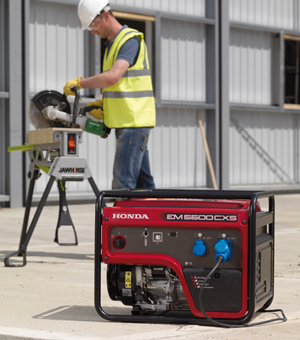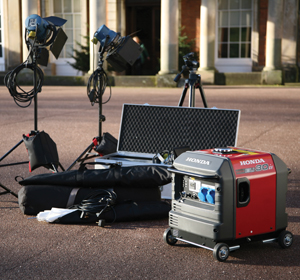9
Sep
How to Choose a Generator – 5 Top Tips You Need to See!
Choosing a generator for home, site or office use can be tough. There are so many different brands, fuel types, power ratings and types of generator available on the market! You can end up tying yourself in knots trying to figure them out.
We can’t make the choice for you, but we can give you these five easy to follow tips to help you on your way. Read on to discover the different variables you will need to consider when making your choice!
“What size generator do I need?” is one of the most common questions we hear from shoppers, but figuring this out is not as complicated as it might seem.
Simply add up the maximum required wattage of everything that the generator will be powering. This includes starting and running wattages. Check the owner’s manual or ID plate on the appliance itself to find these figures. Now you just need to make sure that the generator’s output matches or, preferably, slightly exceeds these requirements. Easy!
Generator sizing varies substantially. The smallest models are around 1000w and amazingly portable, which makes them perfect for very mobile use with low-power tasks. Although generators can reach staggering heights of power, this also makes them reach staggering heights in size! The highest power level you’ll want to consider for home office, or site use is around 7000w. This is enough for a whole range of high-power tasks.
 As well as the overall power rating, also consider other elements such as the quantity and voltage of power outlets. If you will be using a generator for power tools on site, you will need 110v outlets. Most home appliances use 240v.
As well as the overall power rating, also consider other elements such as the quantity and voltage of power outlets. If you will be using a generator for power tools on site, you will need 110v outlets. Most home appliances use 240v.
Finally, don’t forget to consider future possibilities; you don’t want to be forced to buy another generator in a year’s time to match your new, more powerful microwave!
Generators run on three main types of fuel: petrol, diesel and LPG. Choosing which fuel is best for you is the first stage in deciding which generator to buy.
Petrol is the most commonly-used fuel, as it is the most readily-available and well-known. The downsides are its short shelf life of around 12 months, its comparative inefficiency, and the dangers associated with storing and using a flammable fuel. It is also the least-ideal fuel type for use in very cold conditions.
Diesel is most suitable for powering larger generators above 5kW, so it is very uncommon to find in smaller models. It generally provides the lowest operating costs and longest storage time. It can also be used in very cold temperatures when combined with a certain additive.
However, diesel generators are very noisy, environmentally unfriendly and only really effective when run at consistently heavy loads.
Propane/LPG (liquefied petroleum gas) generators are much cleaner than petrol and diesel models. They are also safer to refuel, as you only need to connect a new cylinder rather than fill a hot fuel tank. Furthermore, you can achieve significantly longer run times by using larger LPG cylinders.
LPG has an almost limitless shelf-life, making it the ideal fuel if your generator will be infrequently used. However, LPG generators are often converted from petrol models, which can make them more expensive to buy.
 At first glance, this may seem very similar to Tip 2. After all, 3kW of power is 3kW of power, right? Wrong!
At first glance, this may seem very similar to Tip 2. After all, 3kW of power is 3kW of power, right? Wrong!
Different generators produce power with different levels of “smoothness”. It is important to make sure that you don’t end up paying for technology you don’t need or, worse, damaging your appliances or electronics with power fluctuations.
Standard generators provide somewhat unstable power that suffers from spikes and drops as the load changes. This is generally not a problem when it only results in flickering lights, but the fluctuations can cause damage to high-tech tools, appliances and electronics, like computers.
Manufacturers have solved this problem by including special electronics which smooth out the power. There are different levels of power smoothing: AVR (automatic voltage regulation) and Inverter technology. AVR is a great cost-effective option, but Inverter technology provides the smoothest power. Inverter generators are ideal for people with a higher budget, who require a compact design and use the most sensitive electronics.
Sometimes you will have little choice in the ruggedness of your generator, as the required power and technology will limit your options. If you’ve got a large list to choose from however, then the required durability can be a good way of narrowing it down.
Will you be lugging your generator around a wet and dirty construction site? Will it be at risk of being knocked about and splattered with building materials? Open-frame models are generally most able to put up with such abuse, but there are also “endurance” models which will provide you with a long runtime as well as excellent durability.
Generators are pretty expensive machines, but it is possible to get a rough-and-rugged model on a budget. However, these low-cost models will often be very basic in terms of the features that they can offer. Many of you will have already been forced to rule out a budget model due to the power levels or power stability required, but for the rest of you this is the last major consideration.
There are many usability features that you may decide are worth paying for:
When you ask yourself “What generator do I need?”, there are five key things to keep in mind:
1) The type of fuel the generator uses can affect initial and running costs, cleanliness, reliability, safety and runtime.
2) The required output is important, but easy to work out. Simply calculate maximum required wattage of your various appliances, tools and electronics.
3) Sensitive electronics require special AVR or Inverter technology to run safely.
4) Durability is a key factor for many people who will be using their generator for long periods of time in tough conditions.
5) Extra features will cost you more, but can save you a great deal of time, effort and even money in the long run.
As long as you give each of these points careful consideration, you are sure to buy the right generator for your needs! Now that you’re ready to start the decision process, why not check out our Honda generators as a good starting point?
Tags: generator, generators
Get the latest news, special offers and up-coming events from Kelvin Power Tools delivered direct to your inbox.
Our website uses cookies so that we can provide a better service. Continue to use the site as normal if you're happy with this, or find out how to manage cookies.